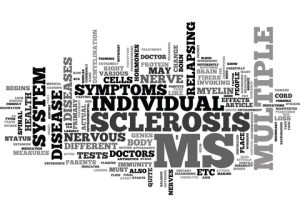
 “What’s going on?—I’m so scared!”
“What’s going on?—I’m so scared!”
February 5, 2013
Diagnosing multiple sclerosis is difficult. Being tested and waiting for a diagnosis is grueling for both the patient and their families. Even in this day and age, the process can take months, or even years in some cases. The stress of the testing, office visits and waiting can send someone over the edge.
I often see online posts about this subject, with an added comment like “I’m scared to death…” This always upsets me because someone or some article is not doing the job of explaining an MS diagnosis in an easy-to-understand manner.
Diagnosing Multiple Sclerosis
It takes a long time to get a diagnosis because it is a process of elimination, to rule out other neurological disorders that could be causing the same type of symptoms.
The process begins with a clinical office evaluation, whereby many things can be initially noted, like your history. There are indicators that a good neurologist will check out—such as the Babinski sign (if the bottom of the foot is scraped and the big toe goes up, not down, it is an indication of a neurological disorder.) Other examples? Hyper reflexes, discoloration of the optic nerve in the eye indicating inflammation/optic neuritis, signs of imbalance or incoordination when walking…
Next come the numerous tests—MRI’s, spinal taps, EVR’s, etc to look for things such as tumors; many neurological disorders have symptoms that mimic multiple sclerosis like Lyme disease or fibromyalgia. Note: The MRI is a powerful tool, but a neurologist will not only use that particular test for an MS diagnosis as many people like to assume. Why? Because lesions may not show if an MRI is done only on the brain; an MRI should be done on the spinal cord as well to check if lesions are there. Also, sometimes spots on the MRI may look like lesions, but they may be due to another reason.
The term “multiple” in multiple sclerosis is important. Why? Multiple symptoms in multiple parts of the nervous system have to occur over multiple periods of time. My first relapse lasted ten months—I had both sensory and motor disturbances in my left arm and left leg. Mysteriously, all symptoms went away except for a slight residual in my left arm. I didn’t have my second relapse until over two years later. That time I went partially blind and I was wetting the bed. When I went back to the neurologist, I was diagnosed immediately! Bingo!—a multiple occurrence in addition to the multiple symptoms in multiple parts of my body.
Finally, a neurologist will most often not give a definite diagnosis until they are definite that it is MS.
In the meantime, what should you do while going through this evaluation and waiting game? Try to stay as healthy as possible. Take all measures you can to sleep, eat, reduce stress and keep your resistance up so that you don’t get a cold or virus. And know that having multiple sclerosis is not a death sentence or that you will end up in a wheelchair. Read on…
A Multiple Sclerosis Diagnosis
Getting an MS diagnosis is extremely frightening. I went through it thirty-two years ago myself, and over the years I have talked to so many people about this as a trained, MS-peer counselor. The fear of the unknown is overwhelming.
Sadly, there are many misconceptions about MS that create a lot of fear. So for starters, here are some facts to clear up some common ones:
• No, MS is not fatal (though in past decades people died from complications of it such as urinary tract problems that led to kidney failure…)
• Although there is no cure, there are treatments available to help symptoms and to slow the relapses/progression of MS.
• It is not congenital (people do not directly inherit MS, though they now know that there is a genetic factor involved.)
• It is not contagious.
• Not everyone ends up in a wheelchair—in the 1980’s the estimate was 1 in 4 (25%). Today, statistics are on your side for a better future prognosis, especially with the new treatments available now and the tremendous research that is happening.
So what should a person do initially when he/she receives a MS diagnosis? These are my recommendations:
Gain as much knowledge and support from the right places. I suggest starting with the National MS Society and other National MS Associations in the beginning. But, there is so much information and so many other resources available it can become overwhelming, confusing and perhaps create more fear. Take baby steps when gathering information.
Your best source of comfort and information will be from another person who has MS, a peer. However, be selective with whom you talk to and use good judgment. Some unknown people online can cause confusion, be uninformed, misleading, and negative.
Make sure you have a good neurologist who treats many others with MS or is a MS specialist. You need to trust your doctor and feel comfortable with him/her. Also, make sure that any other specialists that you may need to see (e.g. physical therapist, urologist, etc.) understand MS and have dealt with MS patients.
Don’t freak out if you don’t get on a treatment right away–it takes time to figure out the right thing to take/do, and waiting won’t severely impact your course, for better or for worse. Keep a journal. You will start to see patterns and learn how your body acts and reacts. An easy way to do this is to use a 12-month calendar, with large blocks to jot brief notes in. It is helpful to see patterns when you are looking at a whole month at one time and easier to reference.
Remember that staying healthy is essential–getting illness/infections could trigger a relapse. MS is an autoimmune disorder; therefore the immune system is not working properly. When you get sick, you may be twice as sick and it may take twice as long to recover as compared to a “normal” person. Relapses usually result in some residual (damage). It’s a must to keep your resistance up—food, sleep, stress management…
Finally, there ARE many things a person can do to manage their MS! The biggest mistake someone with MS can do is nothing, or expecting a shot or a pill to fix everything. There is no magic pill or shot yet that you can take to make it all go away. It takes work, discipline, dedication, attitude, and the common sense to take care of yourself. MS is still a lifetime illness. Until there is a cure for multiple sclerosis, the goal is to stay healthy, prevent new attacks, and prevent disability.
I am a MS survivor as are so many others! Check out my website for more information.
www.DebbieMS.com
 On the cusp of our MS diagnosis, we are gripped by fear and panic. With no cure, we envision ourselves entering a dark tunnel of unknowns. How do we begin living with it? What will life be like? What will be at the other end of the tunnel? A never-ending list of questions follow.
On the cusp of our MS diagnosis, we are gripped by fear and panic. With no cure, we envision ourselves entering a dark tunnel of unknowns. How do we begin living with it? What will life be like? What will be at the other end of the tunnel? A never-ending list of questions follow.

 “What’s going on?—I’m so scared!”
“What’s going on?—I’m so scared!”